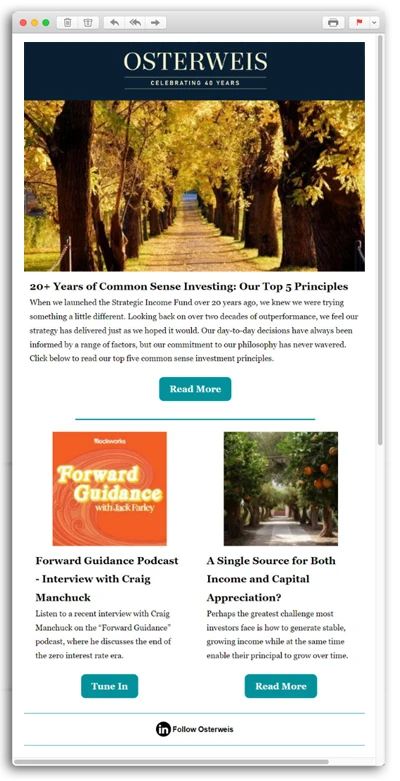Overview
Our small cap growth strategy focuses on identifying high quality companies in emerging industries and defensible growth niches that have open ended growth potential. We seek to buy the stocks of such companies before they are discovered or when investors are very skeptical about future prospects, and capture compound earnings growth over time.
Minimum Investment
$25 million
More Information
Call us at (415) 434-4441 or email at contact@osterweis.com.
Account Details
In our separately managed equity accounts, clients own a portfolio of securities. For these accounts we are able to customize each portfolio based on individual needs such as equity exposure levels, legacy positions, specific investment restrictions, income needs, etc. that may not be met by a mutual fund.
Performance
Small Cap Growth Composite (as of 6/30/25)
| QTD | YTD | 1 YR | 3 YR | 5 YR | 7 YR | 10 YR | 15 YR | INCEP (7/1/2006) |
|
|---|---|---|---|---|---|---|---|---|---|
| Small Cap Growth Composite (gross) | 8.91% | -6.98% | -0.53% | 14.01% | 8.55% | 11.13% | 12.26% | 15.48% | 13.67% |
| Small Cap Growth Composite (net) | 8.66 | -7.40 | -1.45 | 12.96 | 7.54 | 10.08 | 11.18 | 14.36 | 12.56 |
| Russell 2000 Growth Index | 11.97 | -0.48 | 9.73 | 12.38 | 7.42 | 5.69 | 7.14 | 11.06 | 8.18 |
Philosophy
We believe using a strict valuation discipline to build a concentrated portfolio of high-quality companies with rapid and sustainable revenue growth along with long-term profits should generate outperformance over time.
We define quality as companies with the following four characteristics: (1) a distinct proprietary advantage; (2) a leading position in the industry; (3) potential for margin expansion; and (4) the presence of a strong management team. We view rapid revenue growth as organic growth that averages 30% annually.
Valuation discipline is a critical component of our approach. We look for opportunities with at least 100% potential upside using an industry appropriate multiple that does not exceed 30x P/E for companies that we believe fit our portfolio. This not only helps us to identify fast growing companies that we believe are potentially breaking new barriers in their respective industries but plays an important role in managing portfolio risk.
Past performance does not guarantee future results.
Rates of return for periods greater than one year are annualized. The information given for this composite is historic and should not be taken as an indication of future performance. Performance returns are presented both before and after the deduction of advisory fees. Portfolio returns are calculated using a time-weighted return method. Portfolio returns reflect the reinvestment of dividends and other income and the deduction of brokerage fees, other commissions if any, and foreign withholding taxes. For the period 10/1/2012-12/31/2015, gross and net portfolio returns reflect the deduction of custodial, administrative, audit, legal, operating, and other expenses. Composite returns are calculated monthly by weighting portfolio returns by the beginning market value. Net return calculation:
A. For the period 7/1/2006-3/31/2014, composite net returns reflect the monthly deduction of an annual model advisory fee of 1.00%:
A1. For the period 7/1/2006-9/30/2012, one or more accounts paid a fee higher than the 1.00% model fee. During this period, the composite net return using the model fee of 1.00% was 10.95%. The composite net return using actual fees paid was 10.61%.
A2. For the period 10/1/2012-3/31/2014, no account in the composite paid a fee higher than the 1.00% model fee.
C. From 1/1/2020 onward, the composite net return is calculated using actual advisory fees, including any applicable mutual fund fee waivers.
D. Our fees may vary between accounts due to portfolio size, client type, or other factors.
Performance for the periods 7/1/2006-9/30/2012 and 10/1/2012-3/31/2016 represents the results of portfolios managed by the investment team while at RS Investment Management Co. LLC and Callinan Asset Management LLC, respectively, and employing the same investment strategy being used at OCM.
The Russell 2000 Growth Index (Russell 2000G) is a market-capitalization-weighted index representing the small cap growth segment of U.S. equities.
Clients invested in separately managed emerging growth accounts are subject to various risks including potential loss of principal, general market risk, small and medium-sized company risk, foreign securities and emerging markets risk and default risk. For a complete discussion of the risks involved, please see our Form ADV Brochure and refer to Item 8.
The Small Cap Growth Composite includes all fee-paying separately managed accounts, limited partnerships, and mutual funds that are predominantly invested in a concentrated selection of the equity securities of small and medium capitalization companies that can rapidly grow revenues and earnings. Portfolios normally remain primarily invested in equity securities except in times of unusual market stress when a more defensive allocation may be deemed prudent. The non-equity portion may be invested in holdings such as cash, cash equivalents, short-term debt securities, mutual funds, and ETFs. The benchmark is the Russell 2000® Growth Index.








